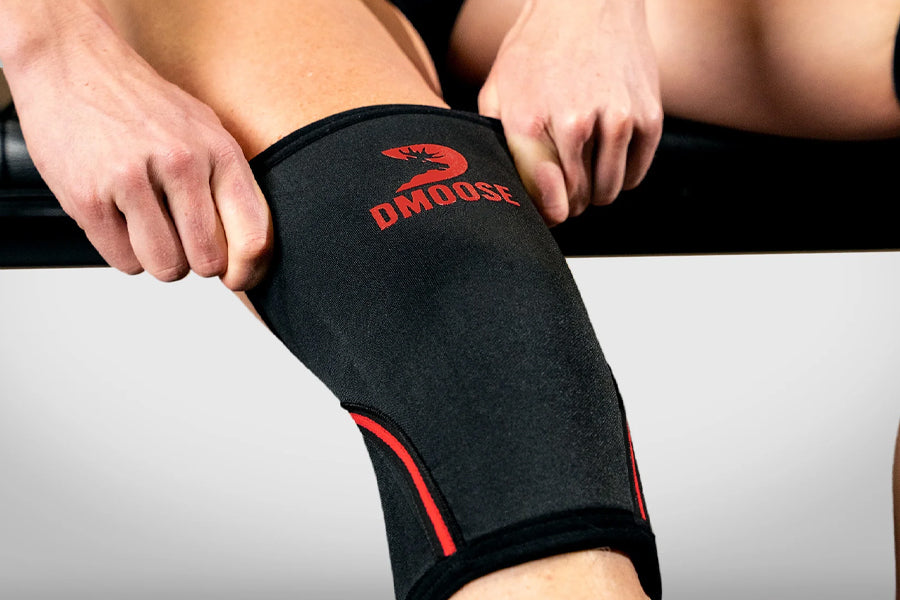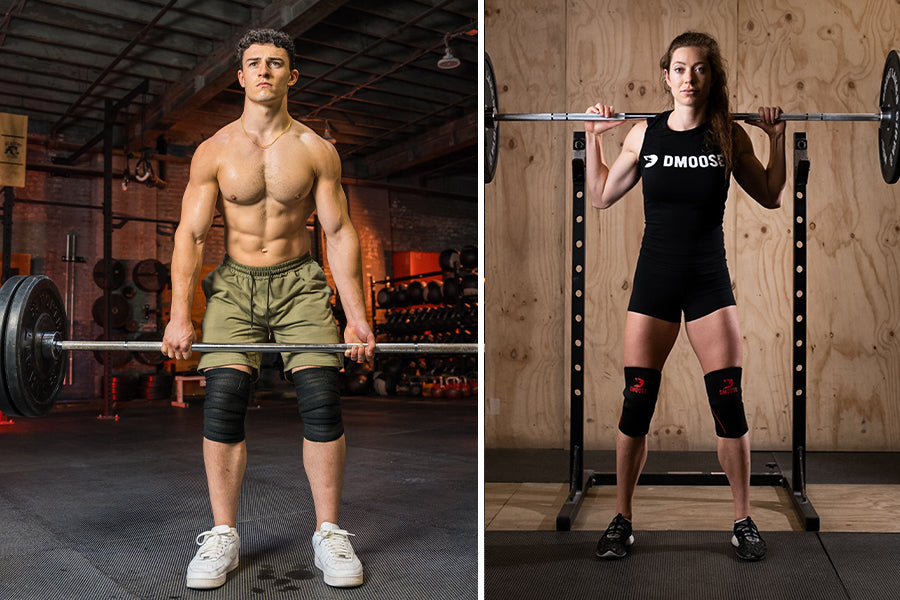We all know how crucial it is to stay injury and pain-free while pushing our limits during workouts.
One common area of concern? How to prevent knee pain when working out.
Getting the right knee support is the answer since knees do a lot of heavy lifting, literally.
This article is your go-to guide for understanding, choosing, and using knee support for working out effectively.
It’ll ensure your knees stay as strong and healthy as you are.
Why Is Knee Support for Working Out Necessary?
Well, there are multiple reasons for getting knee support while working out. And to understand those, it’s important to understand the basic knee anatomy first!
Anatomy of the Knee

- Knee Basics: Consider your knee a complex hinge that lets your leg bend and straighten.
- Key Components: It's made up of bones (femur, tibia, and patella), ligaments, tendons, and cartilage.
- Why It Matters: In workouts, your knee absorbs impact, balances weight, and enables movement.
Common Knee Injuries in Fitness

- ACL Tears: A sudden twist or direct hit can tear this crucial ligament.
- Meniscus Tears: Twisting your knee with weight on it can lead to this injury.
- Tendonitis: Overuse can inflame the tendons, causing pain and swelling.
The Role of Knee Support

- Injury Prevention: Proper support can reduce the risk of knee injuries.
- Aid in Recovery: Knee support can also help heal post-injury.
- Enhanced Performance: They provide stability and confidence during heavy lifts or high-impact activities.
Now, let’s move to the types of knee support for exercise.
Types of Knee Support for Exercise
When it comes to protecting your knees during workouts, not all supports are created equal.
Different types cater to various needs, from general compression to specific injury prevention.
Let's break down the most common types of knee supports you'll encounter and how they reduce knee pain from working out.
Workout Knee Sleeves

Workout knee sleeves are the go-to for general knee support.
They're like a snug, comforting hug for your knees, offering both protection and a bit of a performance boost.
Benefits: They provide warmth, increase blood flow, and offer a moderate level of support.
Best Practices: Ideal for activities like weightlifting, squats, and general gym workouts. They're not designed for serious knee injuries, though.
Knee Wraps

These are for those pesky pains that come from overuse or specific conditions like runners' or jumper's knees.
Use Cases: They're simple but effective, applying pressure to just the right spot below the knee to alleviate pain.
When to Use Them: Best for repetitive motion activities – think squats and weightlifting exercises.
Knee Braces

Knee braces are the heavy hitters in knee support. They're designed for those who need more than just a little squeeze around the knee.
Types: You've got prophylactic braces for injury prevention, functional braces for support after an injury, and rehabilitative braces for post-surgery.
Uses and Considerations: Pick a brace based on your specific needs. Make sure it fits right and doesn't restrict your movement too much.
If you're recovering from a serious injury, it's best to talk to a pro before choosing one.
FYI: Knee braces are not directly linked to working out. They’re knee support that people choose for post-surgery recovery.
By understanding the different types of knee supports available, you can make a more informed decision about what's best for your knees and your workout.
How to Choose the Right Knee Support?
Picking the right knee support isn't just about grabbing the first one you see on the shelf.
It's about finding the perfect match for your knees and your workout style.
Below are key factors you should consider to make sure you get the knee support for walking that's just right for you.
Factors to Consider
- Material: Look for breathable, moisture-absorbing fabrics.
- Size: Measure your knee to get the right fit – too tight can restrict blood flow, and too loose won’t offer enough support.
- Support Level: Varies from light to heavy; choose based on your activity and knee condition.
- Activity Type: Different supports suit different activities – weightlifting, running, basketball, etc.
Fit and Comfort
- Proper Fit: Should feel snug but not too tight; you should be able to move freely.
- Comfort: Shouldn’t dig into your skin or cause irritation.
- Trial and Error: It might take a few tries to find the perfect fit and type.
When to Replace Knee Supports
- Lifespan: Depends on usage; frequent users should replace them more often.
- Wear and Tear: Look for signs like loosening, fraying, or reduced elasticity.
So, Is Exercising With Knee Injury Possible?

Absolutely, you can still exercise with a knee injury, but there's a big "but" here.
If your knee injury is severe, it's not a good idea to power through your regular workout routine. That could make things worse.
Now, if you've got a knee injury and you're itching to stay active, here's the deal:
- Talk to Your Doctor: Before you do anything, have a chat with your doctor. They know your situation best and can tell you what's safe and what's not.
- Start Slow: If your doctor gives you the green light, start with easy low-impact exercises that won't put too much strain on your knee.
- Use Knee Support: This is where knee supports or braces come in handy. They can help stabilize your knee and keep it safe during your workouts.
- Focus on Rehabilitation Exercises: Do specific exercises, like gentle stretching or strengthening exercises targeting the muscles around your knee.
How Do You Wear/Use Knee Support for Working Out?
We’ll discuss how to use knee support for working out. We will talk about knee sleeves and knee wraps only.
Because a knee brace is more related to post-surgery recovery.
How to Wear Knee Sleeves?

- Sit down and take one sleeve. Open it up with both hands and slide your foot through it.
- Ensure you have the right size of the knee sleeve.
- Pull the sleeve up your leg until the wider opening is just above your knee, and the narrower part is below your knee. The sleeve should cover the knee completely.
- Once the sleeve is in place, adjust it so it sits comfortably. It should feel snug around your knee but not too tight.
- You should be able to bend your knee easily without the sleeve bunching up or sliding down.
- If you're wearing sleeves on both knees, repeat the same process for the other leg.
- Stand up and walk around a bit to make sure the sleeves stay in place and feel comfortable. They shouldn't roll down or pinch your skin.
How to Use Knee Wraps?
- Completely open the knee wrap. You'll notice that these wraps have a Velcro attachment, which is super handy for securing them in place.
- Place the wrap with the white part (or the non-Velcro side) facing down on top of your leg. You'll want to start wrapping just below your knee.
- Take the end of the wrap and place it over the top of your leg, just below the knee. Ensure there's tension in the wrap to ensure it's snug but not too tight.
- Overlap each layer by about half the width of the wrap. It ensures even coverage and support. Keep the tension not too loose, not too tight.
- Keep wrapping, moving upwards over your knee and then above the knee.
- Once you've used up all the wrap, the Velcro part should be facing upwards. Attach the Velcro to secure the wrap in place.
- The wrap should feel supportive and snug but not so tight that it cuts off circulation or feels uncomfortable.
The Bottom Line
Knee support is necessary for working out since you must protect your knee muscles from pain and injury.
That’s why getting the right and best knee support for working out is a must.
Among various options, DMoose offers you the ultimate knee support in the form of knee wraps and knee sleeves under one roof.
Besides, we also have reversible and compression knee support for warmth and compression for intense training sessions.
So, what are you waiting for? Get the right lifting support for upgraded workouts!
Reading List
5 Best Non-Surgical Techniques to Eliminate Knee Fat, According to Experts
5MM Vs. 7MM Knee Sleeves: All the Differences Explained
A Complete Guide: How to Use Knee Wraps, Benefits and Buying Guide
Are Leg Extensions Bad for Your Knees?- Explained










